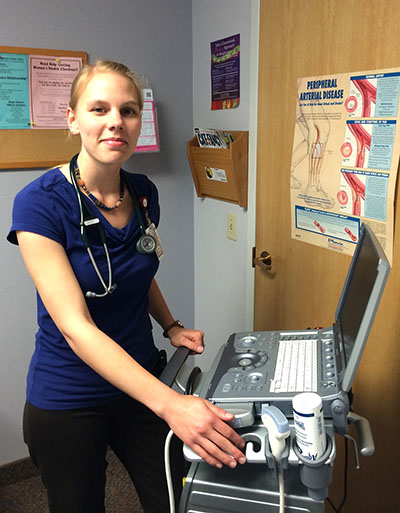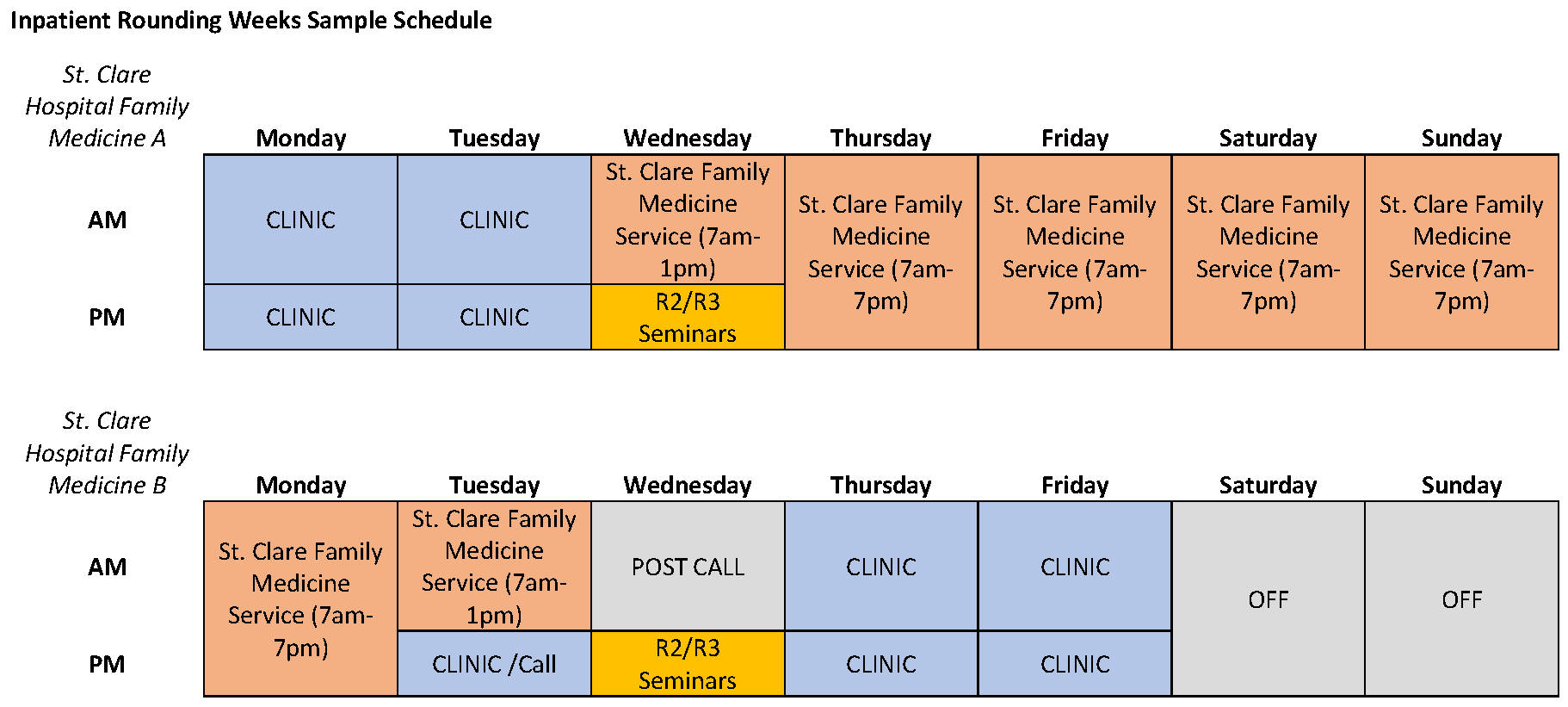First Year
Inpatient Responsibilities
First year residents complete the majority of their rotations at St. Mary’s Hospital and the University of Wisconsin Hospitals and Clinics alongside their Madison Family Medicine residency partners. Surgery and Rural ER are the only curricular areas in which Baraboo residents rotate separately from the Madison residents.
Outpatient Responsibilities
While much of the first year is spent on inpatient hospital service in the Madison area, residents will begin to establish their continuity patient panel at Dean Clinic Baraboo, their FMC, where they will see an average of three to four patients per half-day of clinic, twice weekly. During the first year, residents will not round on patients at St. Clare Hospital, any of the area nursing homes, or take call on behalf of the Dean system.
Second and Third Year
At the beginning in the second year, rural track residents will move within 20 minutes of Baraboo and immerse themselves in full spectrum rural family medicine practice. Flexible, longitudinal curriculum places an emphasis on lifelong learning in an apprenticeship model.
Longitudinal Model
The second and third year curriculum consists of, on average, three weeks of outpatient/specialty rotation followed by one week of rounding with one attending on the family medicine service at the hospital.
Inpatient Rounding Weeks
On average one every 4 weeks, residents are responsible for the care of all inpatients on the family medicine hospital service at St. Clare, including all admissions, rounding, and discharges, from 7:00 am – 8:00 pm, starting Wednesday through the following Tuesday. Patient census ranges from 2-12, usually averaging around 4-5. Additional learning opportunities are available with the hospitalist service on weeks where service may be lighter. Every Tuesday on the last day of the shift, the resident takes call overnight doing admissions with the hospitalist and is then post-call on the following Wednesday, with the option to attend seminar if able. See table below for sample schedule.
Outpatient Weeks
All remaining weeks when residents are not on inpatient service, their time is spent between outpatient continuity clinic in Baraboo (averaging between four and six half days per week), attending Wednesday conference (either virtually or in person in Madison), and arranging outpatient rotations with local specialists (average between two and four half days per week).
Most specialty rotations are fit into these weeks longitudinally, in which residents work with local specialists throughout their PG2 and PG3 years to meet individual learning needs and fulfill required elective hours in sports medicine, cardiology, neurology, maternal fetal medicine, OB/GYN, obstetrics, general surgery, infectious disease, and others. Residents interested in special procedural training such as endoscopies have time build into their outpatient weeks routinely for this.
Depending on the specialty and resident interest, some rotations that are not available locally can be set up for week blocks, in which residents spend six to seven half days per week on a dedicated specialty rotation and two to three half days in continuity clinic.
Call Schedule and Continuity OB Training
Second and third year residents participate in the Dean call pool alongside attending physicians from the Baraboo and Wisconsin Dells clinics.
Residents cover OB/pediatric/and phone call (all taken at the same time, can be taken from home) two days per month when not on inpatient service (one Tuesday and one Friday or Saturday). Just as all of our OB providers in Baraboo are, residents are on call for all of their OBs who are greater than 36 weeks for continuity deliveries, unless out of town or unavailable.
Those residents that would like additional OB or procedural experience can opt in to be alerted when additional learning opportunities arise. Residents are also able to participate in ED call at St. Clare Hospital if they would like the additional training.
Unopposed continuity maternity care is taught by the family medicine attending physicians throughout the second and third years of residency. Optional C-Section training is available at the discretion of the attending surgeons.
Geriatrics
Starting in second year, residents manage a small panel of nursing home patients with a dedicated faculty preceptor. Residents round one half day per month with this preceptor at St. Clare Meadows nursing home. They are also responsible for communicating with nursing staff about questions that may arise in between.
Mentors
Prior to the start of the second year, residents choose a Baraboo faculty mentor, who oversees the resident’s education and assists the resident with acquiring the skills needed for rural practice.
Electives
Residents are allowed a minimum of 12 weeks of elective time. Established electives are listed below and are subject to change based on preceptor availability and curriculum requirements.
- Addiction Disorders
- Allergy
- Behavioral Health
- Cardiology
- C-Section Training
- Diabetes Management
- Endocrinology
- Geriatrics
- Global Health
- Infectious Disease
- Integrative Medicine
- Neurology
- Nutrition
- Oncology
- Nutrition
- Palliative Care and Hospice
- Practice Styles
- Psychiatry
- Pulmonary
- Radiology
- Rheumatology
- Research
- Resident as Teacher
- Tribal Health – Ho Chunk Nation
- Urgent Care
- Urology
- Vasectomies
Electives are subject to change based on preceptor availability.
Additional Educational Opportunities
- Primary Care Conference
- Family Medicine Seminars
- Clustered Didactics
- Gynecology
- Management of Health Systems
- Geriatrics
- Musculoskeletal
- Dermatology
- Urology
- Men’s Health
- Population Health
- Monday Morning Rounds
- CME – held weekly at St. Clare Hospital and Health Services, September through May
- Clinical Didactics – held monthly
- Behavioral Health Didactics – held monthly
In addition, there are several hospital-based committees that 2nd and 3rd year residents are encouraged to join in order to broaden their scope and further develop their practice management skills.
Global Health
Baraboo residents are encouraged to partake in elective global health opportunities during their 2nd and 3rd years, with the support of the University Of Wisconsin Department Of Family Medicine, Madison residency program, a global health leader.


